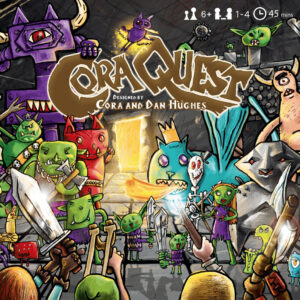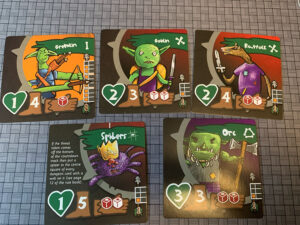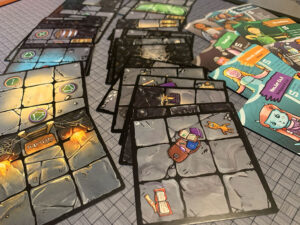 Dungeon crawlers often have a toy factor to them with miniatures, terrain, and evocative art. They can also be relatively complex games to learn with a lot of edge cases and special situations based on the phase of the moon. Like any good parent, I’ve tried to introduce my son to different things and did so with dungeon crawlers with Jerry Hawthorne’s Mice and Mystics and Stuffed Fables. Those two games are, in my opinion, some of the best narrative-based dungeon crawlers for kids and are some of our best-shared gaming experiences together.
Dungeon crawlers often have a toy factor to them with miniatures, terrain, and evocative art. They can also be relatively complex games to learn with a lot of edge cases and special situations based on the phase of the moon. Like any good parent, I’ve tried to introduce my son to different things and did so with dungeon crawlers with Jerry Hawthorne’s Mice and Mystics and Stuffed Fables. Those two games are, in my opinion, some of the best narrative-based dungeon crawlers for kids and are some of our best-shared gaming experiences together.
And that brings us to CoraQuest, designed by the father and daughter team of Dan and Cora Hughes, which was a family project during the early portions of COVID lockdowns in 2020. A neat twist to the game’s style was the art was crowdsourced from children from around the world. Full disclaimer/humble brag—my son drew a piece of art that made it into the game so I had some bias towards this title that you, the reader, should be aware of going into this review.
How does CoraQuest stack up to the heavyweights from Plaid Hat Games?
Game Overview:
CoraQuest has one of the most streamlined rulesets I’ve ever seen in a dungeon crawler. Each their turn each player turn can take up to two full actions and as many free actions as they’d like.
Full actions are:
- Move – Move up to the number of spaces indicated on your character card
- Attack – Roll dice to attack based on your character card and equipped weapon
- Search – Open a chest to draw a treasure card
- Swap – Give/Take/Trade with an adjacent player
- Revive – Wake up a stunned hero

Free actions are using an item or revealing a dungeon tile. Free actions can interrupt full actions allowing players to move, reveal a new dungeon tile, and continue moving.
For combat, each weapon lists a range and the die or dice that are rolled to hit. Additionally, each hero card shows a die to be rolled when attacking. If an attack misses, the character card is flipped over to its determined side which grants an extra white die to their next attack roll.
There’s a countdown track used for special ability cooldowns and an explore token. If the explore token slides off the track, spiders are spawned on all tiles that show spiderwebs.
Enemies are identified at the start of the scenario by name and then are placed by symbols on specific tiles that match the ones on their cards. Enemies move and attack, move twice, or attack twice following very simple rules. Some bosses have some additional rules/special conditions that are clearly indicated on their cards.
If any character reaches zero health, the heroes lose and you read the flavor text at the end of the scenario. If you accomplish your objective you win and read the winning flavor text at the end.

Gameplay Experience:
There’s a nuance between a “kids game” and “game you play with kids.” Mice and Mystics is a game you play with kids. There is practically zero chance a seven-year-old can open those boxes and start playing on their own or with a group of their friends. Even after repeated plays, there’s a little too much for younger gamers to keep track of. CoraQuest, however, is a game that you could hand to a seven-year-old and they could probably read through the rules and start playing. Or more likely: an adult could play with a child a few times and then that child could teach someone else.
There’s a whimsical nature to CoraQuest and it’s in large part due to the children’s art that has been uniformly colored and shaded by Gary King. Another part of the whimsy is the status effects like “stinky” and characters like Wizard Woman and Healer Cat. Lastly, the stories are charming and funny with silly recurring characters and laughable situations. Capturing heroes is something all villains aspire to do, but how many do that so they can try to win Best Spoon at a Spoon Competition?

Dungeons are well-paced as you shuffle story tiles into a deck of other tiles granting you a bit of story every few new tiles albeit in a very linear pattern. The story is usually a few short paragraphs of text which allows the game to keep flowing. The adventures don’t overstay their welcome and are fairly easy to set up. And that’s another area where CoraQuest excels compared to the great Plaid Hat titles—those tend to run a little longer than many younger children’s attention spans.
The mechanics are simple and each adventure is a one-off while still telling an ongoing story with recurring characters. This works well to keep the game simple and easy for younger gamers. LEGO Heroica comes to mind as the only other dungeon crawler that is as streamlined (although that one was a competitive game that was also roll and move). While I’ve been sitting on finishing this review Dan and Cora recently announced an expansion that will be launching on kickstarter in October of 2022. This expansion will offer a campaign mode in addition to other new items, characters, environments, and adventures.
More experienced dungeon crawl fans may yawn at the lack of progression or the simple systems at play but this wasn’t meant for the people who have mastered Gloomhaven as they wait for Frosthaven. This is for their offspring to come out and play games in this typically complicated genre so let’s keep them separated. It’s simple but this game isn’t a total pushover—My family has finished a few adventures with everyone’s health hovering around two and mildly cursing Healer cat for not rolling better when using her healing ability.

But that does bring up that luck does play a large factor in this game and some character abilities need good rolls to be effective. When Healer Cat misses their healing role multiple times it’s disheartening as that’s their thing and they’re not doing it well while others’ abilities are more automatic and they get to be awesome more often.
As I look for things to critique it should be noted that the game is meant for four heroes at all times which could be intimidating for someone new to these games. But here’s where the straight-forward game play makes it very manageable, even for newer players.
Final Thoughts:
CoraQuest is a light and fast-playing dungeon crawler and it is now my go-to to introduce younger gamers to this genre before suggesting more complicated games like Stuffed Fables or Mice and Mystics on their table. CoraQuest introduces tactical combat, individual player powers, and searching for treasure in an accessible way kids will get almost immediately. It also has a reasonably short length for a lot of kids’ goldfish-like attention spans.
Final Score: 4 Stars – CoraQuest is easily one of the best dungeon crawlers for kids and families based on its combination of simple mechanics, whimsical art, and fun narrative.
 Hits:
Hits:
• Simple mechanics that are easy for kids to understand
• Whimsical art drawn by kids
• Silly and engaging narrative
Misses:
• Must have four heroes
• Some heroes’ abilities are more luck dependent than others
• Gameplay is not targeted toward experienced dungeon crawler aficionados





















